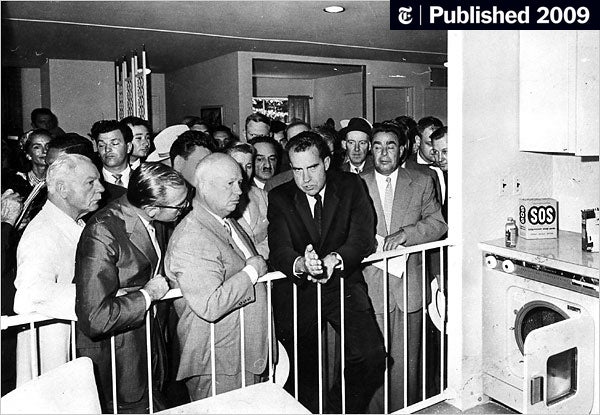On July 24th, 1959, the world witnessed a remarkable exchange between two of the Cold War era’s most prominent figures: United States Vice President Richard Nixon and Soviet Premier Nikita Khrushchev. This iconic event, famously known as the “Kitchen Debate,” took place during the American National Exhibition in Moscow and symbolized the ideological confrontation between the capitalist West and the communist East.
Background Context
The late 1950s marked a period of intense rivalry between the United States and the Soviet Union, known as the Cold War. Tensions were high as both superpowers competed for global influence, with each promoting their respective political and economic systems as superior.
The American National Exhibition
The American National Exhibition in Moscow was intended to showcase American technological advancements, consumer goods, and the lifestyle of the average American citizen. It was a bold attempt by the United States to portray itself as a prosperous and progressive society, contrasting sharply with the communist ideology promoted by the Soviet Union.
The Kitchen Debate Unfolds
Vice President Richard Nixon, accompanied by Soviet Premier Nikita Khrushchev, toured the exhibition’s model kitchen filled with modern American appliances. What began as a scripted diplomatic event quickly escalated into a spirited debate between the two leaders, with each passionately defending their respective political systems and way of life.
Nixon’s Defense of Capitalism
Nixon used the opportunity to extol the virtues of American capitalism, emphasizing individual freedoms, technological innovation, and the prosperity enjoyed by American citizens. He pointed to the kitchen appliances as symbols of American consumerism and the benefits of a free-market economy, contrasting it with what he portrayed as the stagnation and limitations of Soviet communism.
Khrushchev’s Counterarguments
In response, Khrushchev passionately defended the achievements of the Soviet Union, highlighting advancements in space exploration and industrial production. He criticized American capitalism as exploitative and argued that communism offered a more equitable society where everyone had access to basic necessities without the excesses of capitalism.
The Symbolism of the Debate
The Kitchen Debate captured global attention and became symbolic of the broader ideological struggle between East and West during the Cold War. It illustrated the contrasting values and priorities of the two superpowers and underscored their competing visions for the future of global society.
Legacy and Impact
The Kitchen Debate had a lasting impact on Cold War rhetoric and propaganda efforts. It reinforced stereotypes on both sides about the strengths and weaknesses of capitalist and communist systems. The debate also highlighted the role of personal diplomacy and public image in shaping international relations during the Cold War era.
Conclusion
The Kitchen Debate between Richard Nixon and Nikita Khrushchev in Moscow on July 24th, 1959, remains a pivotal moment in Cold War history. It illuminated the deep-seated ideological divisions between the United States and the Soviet Union while demonstrating the power of symbolic gestures and public diplomacy in shaping global perceptions. The debate’s legacy continues to resonate in discussions about political systems, economic ideologies, and the ongoing struggle for influence between nations on the world stage.












What do you think?
It is nice to know your opinion. Leave a comment.